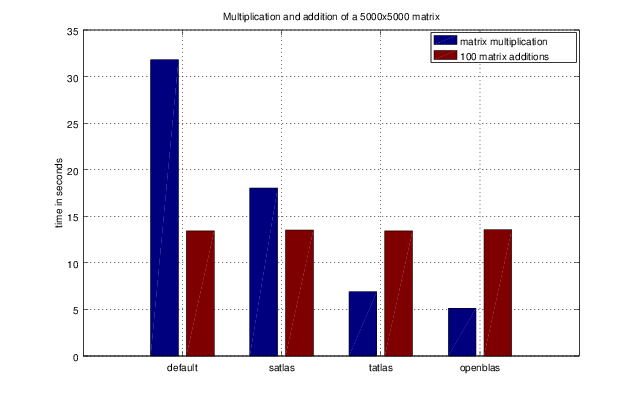Octave is a tool for doing linear algebra. When doing linear algebra one of the most fundamental operations is the matrix multiplication. A straightforward algorithm to do a matrix operation requires O(n³) multiplications. In 196 Strassen developed an algorithm for multiplying big matrices (n > 100 to 1000) which requires O(n^2.807) multiplications.
Octave can use different implementations for doing matrix multiplication, e.g. BLAS, ATLAS and OpenBLAS. We have measured the performances of the different implementations for this post.
All tests were running on a quad-core Intel(R) Core(TM) i7-2670QM CPU @ 2.20GHz with hyperthreading enabled. As Linux we used Linux Mint 17 (Qiana) on which we installed the packages “octave” and “libatlas3-base”. This configuration we will refer to as “default” in this post. We have also tested ATLAS, the single-threaded (“satlas”) and the multi-threaded (“tatlas”) versions and OpenBLAS (“openblas”) which is multi-treaded by default.
Before we compiled ATLAS we have configured it with the following arguments:
./configure -b 64 --shared -D -c -DPentiumCPS=2200 --with-netlib-lapack-tarfile=lapack-3.5.0.tgz
For OpenBLAS we used the default configuration and just executed make to create the libraries.
As all libraries have been created we started Octave as follows:
default : octave -p perf.m satlas : LD_PRELOAD=libsatlas.so octave -p perf.m tatlas : LD_PRELOAD=libtatlas.so octave -p perf.m openblas: LD_PRELOAD=libopenblas.so octave -p perf.m
The fastest implementation is OpenBLAS. It took 5.1 seconds to multiply a 5000x5000 matrix. The multi-threaded ATLAS implementation took 6.9 seconds, the single-threaded implementation took 18 seconds and the default configuration required 32 seconds to multiply the matrix.
Just for comparison we also added 100 times a 5000x5000 matrix. It took for all implementations about 13.5 seconds, i.e. one 5000x5000 matrix addition took approximately 0.135 seconds.
